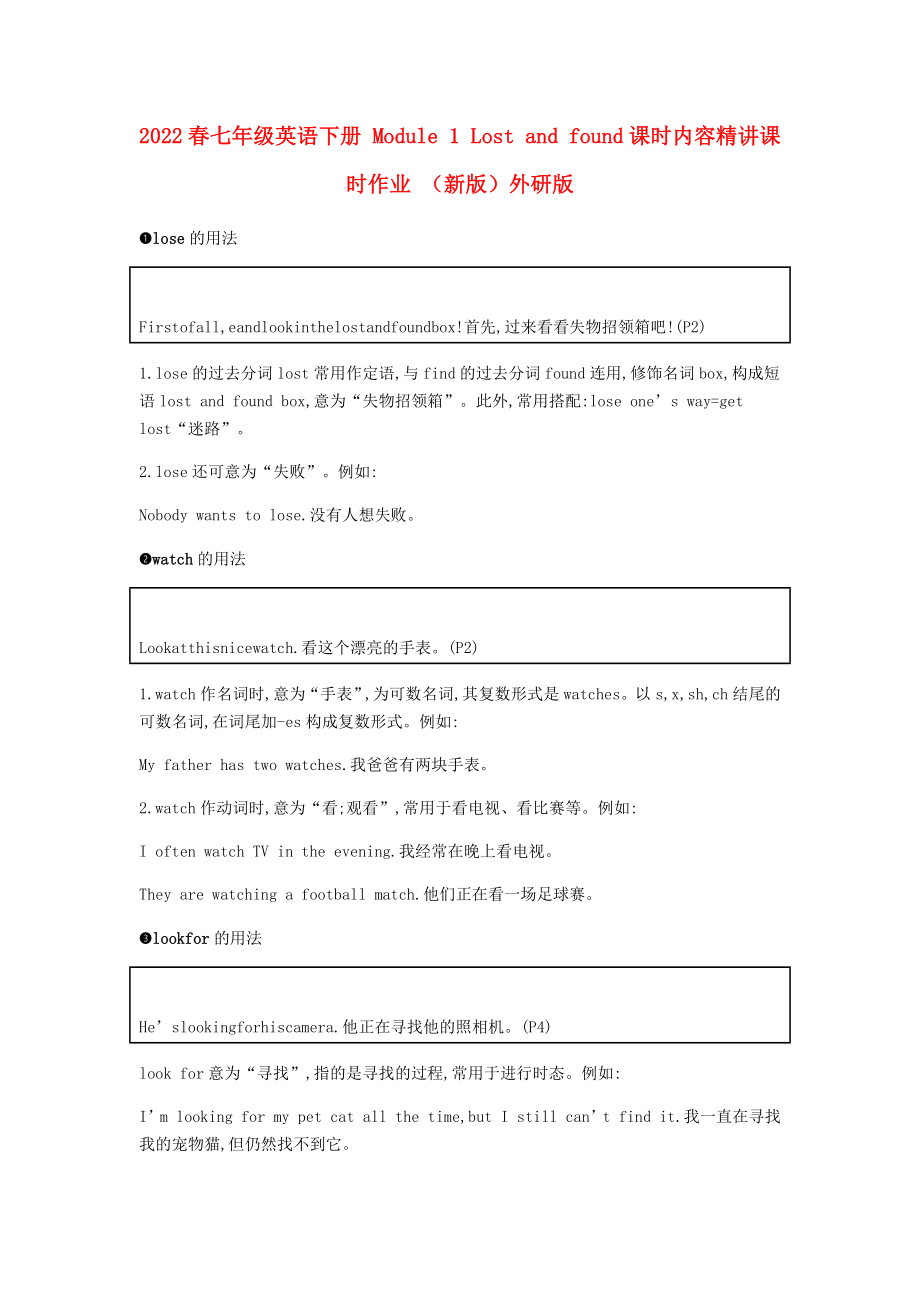《2022春七年級(jí)英語(yǔ)下冊(cè) Module 1 Lost and found課時(shí)內(nèi)容精講課時(shí)作業(yè) (新版)外研版》由會(huì)員分享�����,可在線閱讀�����,更多相關(guān)《2022春七年級(jí)英語(yǔ)下冊(cè) Module 1 Lost and found課時(shí)內(nèi)容精講課時(shí)作業(yè) (新版)外研版(3頁(yè)珍藏版)》請(qǐng)?jiān)谘b配圖網(wǎng)上搜索�。
1、2022春七年級(jí)英語(yǔ)下冊(cè) Module 1 Lost and found課時(shí)內(nèi)容精講課時(shí)作業(yè) (新版)外研版
?lose的用法
Firstofall,eandlookinthelostandfoundbox!首先,過(guò)來(lái)看看失物招領(lǐng)箱吧!(P2)
1.lose的過(guò)去分詞lost常用作定語(yǔ),與find的過(guò)去分詞found連用,修飾名詞box,構(gòu)成短語(yǔ)lost and found box,意為“失物招領(lǐng)箱”��。此外,常用搭配:lose one’s way=get lost“迷路”�。
2.lose還可意為“失敗”。例如:
Nobody wants to lose.沒(méi)有人想失敗���。
?wat
2�、ch的用法
Lookatthisnicewatch.看這個(gè)漂亮的手表����。(P2)
1.watch作名詞時(shí),意為“手表”,為可數(shù)名詞,其復(fù)數(shù)形式是watches。以s,x,sh,ch結(jié)尾的可數(shù)名詞,在詞尾加-es構(gòu)成復(fù)數(shù)形式�����。例如:
My father has two watches.我爸爸有兩塊手表�����。
2.watch作動(dòng)詞時(shí),意為“看;觀看”,常用于看電視�����、看比賽等。例如:
I often watch TV in the evening.我經(jīng)常在晚上看電視����。
They are watching a football match.他們正在看一場(chǎng)足球賽。
?lookfor的用法
3�����、
He’slookingforhiscamera.他正在尋找他的照相機(jī)����。(P4)
look for意為“尋找”,指的是尋找的過(guò)程,常用于進(jìn)行時(shí)態(tài)。例如:
I’m looking for my pet cat all the time,but I still can’t find it.我一直在尋找我的寵物貓,但仍然找不到它�。
辨析lookfor與find
look for
意為“尋找”,強(qiáng)調(diào)“找”的過(guò)程。
find
意為“找到;發(fā)現(xiàn)”,強(qiáng)調(diào)“找”的結(jié)果�����。
?geton的用法
Amanisgettingonthebus.一個(gè)男的正在上車�。(P4)
get on指“上
4、(車����、船、飛機(jī)等)”,其反義短語(yǔ)是get off,意為“下(車��、船��、飛機(jī)等)”���。例如:
They should let the old get on the bus first.他們應(yīng)當(dāng)先讓老人上車�����。
They usually get off the bus at park.他們通常在公園下車�����。
get短語(yǔ)小結(jié)
gethome 到家 getinto 進(jìn)入
getlost 迷路 geton 上車
getoff 下車 getup 起床
getto 到達(dá) gettoknow 認(rèn)識(shí)
gettogether 聚在一起
getonwellwithsb. 與某人相處得好
?in
5�、ahurry的用法
Peopleoftenlosethingswhenthey’retravellingorwhenthey’reinahurry.人們?cè)诼眯兄谢虼颐r(shí)經(jīng)常丟東西���。(P4)
1.在短語(yǔ)in a hurry中,hurry為名詞�����。hurry也可以作動(dòng)詞,常用搭配為hurry to do sth.,意為“匆忙去做某事”��。例如:
He always hurries to work in the morning.早晨,他總是匆忙地去上班���。
2.no hurry意為“不忙,不必著急,有足夠的時(shí)間”�����。hurry up意為“快點(diǎn)兒,趕快”�����。例如:
There’s no hurry,so do it slowly and carefully.不用著急,所以慢慢地�、細(xì)心地做����。
Hurry up,or you’ll be late.快點(diǎn)兒,否則你將會(huì)遲到。
 2022春七年級(jí)英語(yǔ)下冊(cè) Module 1 Lost and found課時(shí)內(nèi)容精講課時(shí)作業(yè) (新版)外研版
2022春七年級(jí)英語(yǔ)下冊(cè) Module 1 Lost and found課時(shí)內(nèi)容精講課時(shí)作業(yè) (新版)外研版

